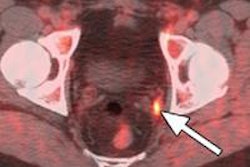GE Healthcare is touting two studies being presented at the Alzheimer's Association International Conference (AAIC) in Copenhagen that show how its Vizamyl (flutemetamol F-18) radiopharmaceutical aids dementia diagnosis.
In the first study, a positive flutemetamol-PET scan for brain amyloid was a significant predictor of progression from amnestic mild cognitive impairment (aMCI) to probable Alzheimer's disease. The study included 232 subjects with mild cognitive impairment who received a flutemetamol injection and underwent brain scans. The results showed that patients with positive Vizamyl scans were approximately 2.5 times more likely to convert to probable Alzheimer's than subjects with negative scans.
The second study confirmed the diagnostic value of flutemetamol in identifying the presence of neuritic amyloid in patients with an early onset of dementia. Eighty patients with early-onset dementia (younger than 70 years of age) underwent flutemetamol-PET scans to determine positive or negative amyloid presence. Results showed that 20% of patients had a change in diagnosis following review of the flutemetamol-PET scan. For patients diagnosed with Alzheimer's disease prior to the scans and who had an amyloid-negative result, the clinical diagnosis changed in 12 of 15 cases.
Vizamyl is indicated for PET brain imaging to estimate beta-amyloid neuritic plaque density in adult patients with cognitive impairment who are being evaluated for Alzheimer's disease or other causes of cognitive decline.
The results collectively show that Vizamyl can help physicians identify the histopathology associated with an Alzheimer's disease diagnosis in specific patients, said Ger Brophy, PhD, GE's chief technology officer of life sciences.



















